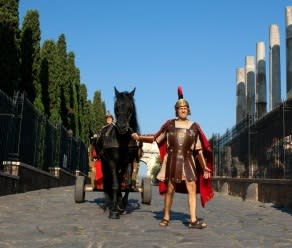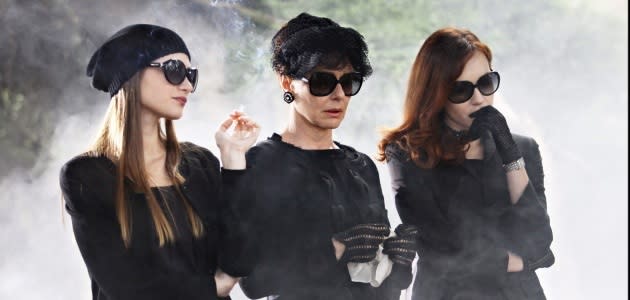Film fest full of Italian treats
The Italian Film Festival might be an opportunity to see the latest in cinema releases but this year the season opens and closes with films that pay homage to the Eternal City - Rome.
Tomorrow's opening film of the two- week festival is The Great Beauty, a celebration of the world of Federico Fellini and Roberto Rossellini, directors who in the 60s created a cinematic Rome that was filled with style, sophistication and a certain world-weariness that came from too much pleasure.
Paolo Sorrentino's homage to the Eternal City, released this year, takes the form of the tale of a 65-year-old jaded journalist whose single life is revitalised when he gets a phone call from an old flame. The Great Beauty has been described as a series of sensuous pleasures, its nostalgic atmosphere blending with a fresh take on the delights that are Rome.
The closer to the season is a 1972 classic - Fellini's Roma, his personal homage to the city that has become the location for so many Italian dramas, romances and comedies.
Roma is similar in many ways to The Great Beauty, a loosely autobiographical film following Fellini's personal journey from provincial Rimini to his arrival in Rome in 1931 during the dictatorship of Mussolini. Fellini explores his adopted city through spectacular and sometimes bizarre situations and characters, moving from brothels, theatre stages and music halls to the streets.
In-between these two films about Rome is a wealth of productions made over the past two years, revealing the depth and diversity of Italian feature filmmaking, plus one extraordinary documentary on asylum seekers.
As can be expected of a culture that contains elements of the absurd in its political and social life, there are political dramas with a satirical edge, romantic comedies, tender relationship sagas and some that are hard to categorise.
One of the most controversial will be Honey, the story of a young woman who dispassionately goes about her job of helping people to commit suicide.
Newcomer Jasmine Trinca plays the eponymous Honey, whose tender ministrations to those who intend to die involves regular trips to Mexico to buy the animal drugs needed to complete the task.
Honey raises the usual complex issues about euthanasia, with the complications that ensue when an elderly professor wants to die - not because he has a terminal illness but because he is depressed. When Honey develops a close relationship with the professor, she is forced to re-examine her role in assisted suicide.
There are other films on political and personal themes that will raise questions about the role of the individual in society and how relationships are shaped by family and personal values.
One of the films to deal with family values is A Perfect Family, in which a lonely middle-aged man hires a group of actors to simulate a family gathering at Christmas time. It is billed as a comedy but of the bittersweet variety.
Among these fictional examinations of life is a real-life drama The Human Cargo, which shows that reality throws up more odd behaviour than anything dreamt up by scriptwriters.
The documentary tells the story of how up to 20,000 Albanians crowded aboard a cargo ship on a summer afternoon in 1991 and through sheer pressure of numbers, forced the captain to sail them to asylum in Italy.
Its first-hand accounts of what happened at the port town of Bari makes for riveting cinema and will leave viewers wondering how people could behave in such an impulsive way. The contemporary Italian education system comes under scrutiny in the engrossing The Red and the Blue, adapted from a novel by a schoolteacher.
The film reveals the way teachers and teenagers cope with life in a busy high school, whether it's the school's female principal mothering a young boy or the veteran teacher cynically giving everyone a pass mark.
Italians love their comedy, especially if it is about couples about to get married, or entering a relationship. The Worst Week of My Life chronicles the trials of a groom-to-be in the run-up to his wedding day. If it sounds familiar it is because it's based on the British television series of the same name.
What might be less familiar in theme is comedy Ben Hur, in which an immigrant worker stands in for a Roman who dresses up at the Colosseum as a gladiator for tourist photographs.
And on the political side, the nature of contemporary political campaigns is examined in Long Live Freedom, where a missing candidate is replaced by his twin brother, who turns out to be more honest than his brother.
Stranger things have happened.



